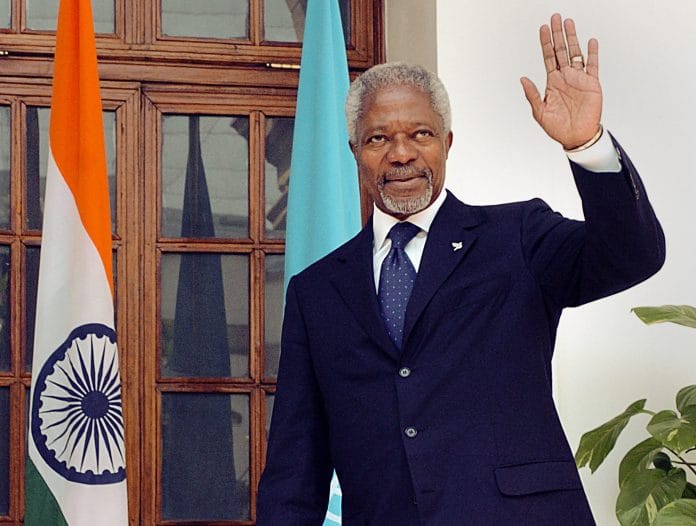PM Modi calls him ‘a conscience keeper of international peace and security’; as UN chief, Annan was critical of India’s nuclear tests in 1998.
New Delhi: The first black African to lead the United Nations, Kofi Annan’s death Saturday afternoon has evoked a wide range of sentiment, with prime minister Narendra Modi describing him as “a great African diplomat and humanitarian” as well as “a conscience keeper of international peace and security”.
Annan, who served two terms as UN secretary General from January 1, 1997, to December 31, 2006, was 80 years old. He hailed from Ghana. His foundation announced his death in Switzerland today in a tweet, saying he died after a short, unspecified illness.
Congress MP from Thiruvananthapuram, Shashi Tharoor, who served closely with Annan at the UN, said he had “lost an elder brother.”
India’s relations with Kofi Annan were both testy and cordial. As head of the UN, he was critical of India’s nuclear tests in 1998. In 2003, he wrote letters to both then prime minister Atal Behari Vajpayee and former Pakistani president Pervez Musharraf saying that “that every effort had to be made to foster a calmer atmosphere so that differences – no matter how great – could be resolved through dialogue and diplomacy.”
Over time, though, Annan acknowledged that a country of India’s size must play a greater role in international affairs, from peace-keeping to a possible permanent seat at the UN Security Council.
Also read: Huge drop in HIV infections in India due to sustained efforts: UN
He made two visits to India, in 2001 and 2005.
Extending an olive branch, the government picked the Centre for Development of Advanced Computing to start a Ghana Kofi Annan Centre for Excellence in Accra, Ghana.
Kofi Annan joined the UN in 1962 as an administrative and budget officer with the World Health Organization. Rising quickly through the ranks, he worked with the UN Emergency Force and the United Nations High Commission for Refugees, as well as with countries like Syria, Ethiopia, former Yugoslavia and Egypt.
He was responsible for the formation of the Peacebuilding Commission and the Human Rights Council in 2005. He played an essential role in the formation of the Global Fund to fight diseases like AIDS, tuberculosis and malaria.
Annan was also involved with Timor-Leste to gain freedom Indonesia, he helped Nigeria transition to civilian rule and contributed to reduced hostilities between Israel and Hizbollah. In addition he also helped Nigeria and Cameroon settle the dispute of the Bakassi peninsula at the International Court of Justice.
The UN and its member nations adopted UN’s first ever counterterrorism strategy. His initiative “Global Compact” was the world’s largest effort to encourage corporate social responsibility. He introduced the “millennium development goals” to the UN.
In appreciation of his work and efforts, Kofi Annan was awarded the Nobel Peace Prize in 2011 jointly with the organization.
In 2016, the Myanmar government entrusted him to head a panel that was aimed at finding solutions to the problems faced by the Rohingyas in the Rakhine state.
In a statement comparing Annan to the UN itself, UN Secretary General Antonio Guterres said, “Kofi Annan was a guiding force for good. It is with profound sadness that I learned of his passing. In many ways, Kofi Annan was the United Nations.”






